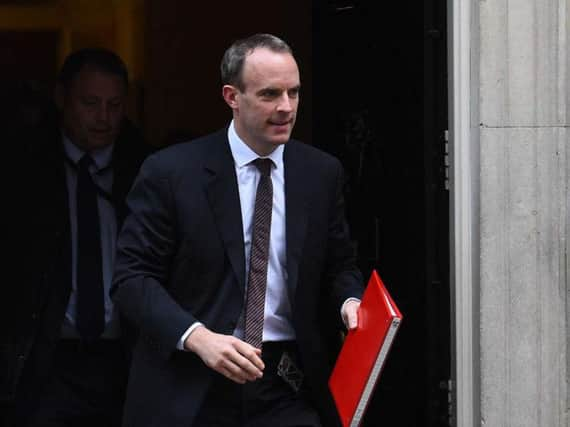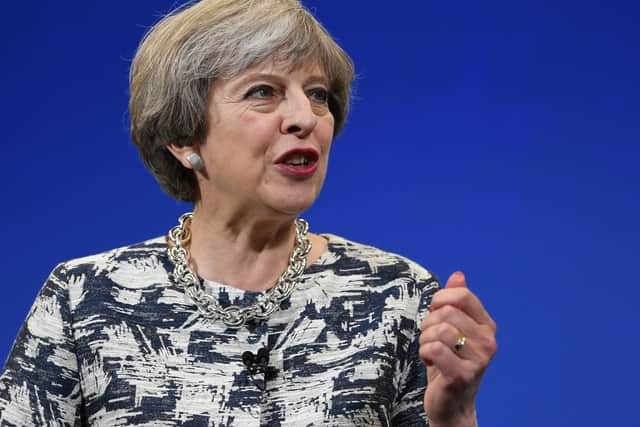Brexit secretary Dominic Raab resigns over draft agreement on Britain's exit from EU


The minister, who took over form David Davis in teh summer, resigned from his post today (Thursday, November 15), sharing a copy of the letter he sent to the Prime Minister on his Twitter account.
In it, he said: "I regret to say that, following the Cabinet meeting yesterday on the Brexit deal, I must resign.
Advertisement
Hide AdAdvertisement
Hide Ad"I understand why you have chosen to pursue the deal with EU on the terms proposed, and I respect the different views held in good faith by all of our colleagues.
"For my part, I can support the deal for two reasons."
He added: "First, I believe the regulatory regime proposed for Northern Ireland presents a very real threat to the integrity of the United Kingdom.
"Second, I cannot support an indefinite backstop arrangement, where the EU holds a veto over our ability to exit."


Theresa May announced yesterday that her Brexit deal had been approved by the Cabinet - but added that "difficult days lie ahead".
Advertisement
Hide AdAdvertisement
Hide AdHours earlier Shailesh Vara had quit as minister of state for Northern Ireland, saying Mrs May's agreement, "leaves the UK in a halfway house with no time limit on when we will finally be a sovereign nation".
A majority of MPs will need to vote for the draft withdrawal document for it to be given the green light - the magic number of votes being 320 for a majority.
MPs who are ministers of Government will be bound to support Mrs May's Brexit plans owing to collective responsibility - and Mr Raab now joins the likes of Boris Johnson, who resigned over the Chequers deal.
Government loyalists would vote in favour of the deal, as well as a number of Brexiteer MPs who may have been spooked by the PM's message that it was this deal, no deal or no Brexit.
Advertisement
Hide AdAdvertisement
Hide AdThe Liberal Democrats, Greens and Plaid Cymru have said they are opposed to a deal, while the Democratic Unionist Party's stance is an uncertain one.
Arlene Foster has said the Prime Minister is "fully aware of our position and concerns" over Northern Ireland being treated differently to the rest of the UK.
It seems unlikely the Scottish National Party would support the deal given Nicola Sturgeon said the agreement would be "a bad one for Scotland".
There is division within the Conservative party too, with the European Research Group, led by Jacob Rees-Mogg, claiming it has 80 MPs ready to vote against what it sees as Mrs May's capitulation to Brussels.
Advertisement
Hide AdAdvertisement
Hide AdThere is also a division within the Labour party, as some MPs reluctantly support it because their constituents voted to leave. Others may go against party leader Jeremy Corbyn, reasoning that the Prime Minister's Brexit deal is still better than no deal at all.
North East MEP Jonathan Arnott has said the Prime Minister should be ashamed of agreeing to the draft Brexit agreement.
He also said there were "serious concerns" about what Britain would be getting in return for the £39billion divorce bill.
Mr Arnott said: "The direction proposed would keep the UK tied into a customs territory - the Customs Union in all but name - indefinitely.
Advertisement
Hide AdAdvertisement
Hide Ad"This would make it impossible for us to negotiate realistic, effective trade deals with third countries.
“EU courts would, in all but name, overrule UK courts. This is a natural consequence of two things: firstly, whenever the text requires the UK to adopt measures having identical effect to EU measures, the ultimate arbiters are the EU courts.
"Secondly, the text requires the UK to 'have regard to' EU court decisions."
The MEP also questioned how much it left "unsaid or hidden" in the draft withdrawal agreement.